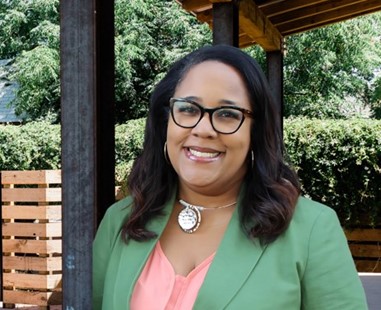SPOTLIGHT: Jeanne Turner, Work-based Learning Consultant, Office of Career and Technical Education (CTE), NC Department of Public Instruction
<<< Back to August 2024 Newsletter
 |
JEANNE TURNER As NC DPI's Work-based Learning Consultant, Jeanne Turner leads professional development initiatives statewide, ensures relevant curriculum and assessments for work-based learning courses, and fosters collaboration among education, government, and business sectors. In her role, Jeanne manages program implementation and provides technical assistance to enrich work-based learning for students in grades 6-12. Her mission is to be an accessible resource, advancing education and workforce development in North Carolina. She aims to cultivate a thriving community that enhances the state's work-based learning ecosystem. |
How did you begin your career and how has it led to your current position with NC DPI?
In 1998, I started teaching marketing classes, including courses like Principles of Business. I was the Distributive Education Clubs of America (DECA) advisor as well. DECA is a career technical student organization that prepares emerging leaders and entrepreneurs for careers in marketing, finance, hospitality, and management in high schools and colleges around the globe.
I then got my master’s degree and became a school counselor. That led to my becoming the Career Development Coordinator (CDC). I had been involved with career development efforts for decades and was ready for a new challenge when I applied for my current position in 2023. It was an opportunity to learn and a chance to work out of my comfort zone. It has been exciting, and I have been reinvigorated with having a global perspective rather than working at the program level.
In your role, you manage program implementation and provide technical assistance to enrich work-based learning for students in grades 6-12. What does that look like?
My new role is truly varied. I have performance goals in different areas, including:
Why is work-based learning important in career development?
Work-based learning is crucial for bridging the gap between education and the workforce, preparing students for successful and meaningful careers, and fostering collaboration between educational institutions and industry partners. There is a work-based learning cycle of experiences. Reflecting on my early teaching career, I realize I was incorporating elements of work-based learning to support my students. Work-based learning is invaluable at all levels: high school students can explore career paths, while college students can build professional networks and secure promising jobs.
The work-based learning cycle of experiences – awareness, exploration, preparation and participation, is a functional part of the career development continuum. These opportunities are meant to engage, motivate, and augment the learning process. These WBL opportunities can be done in conjunction with private, for-profit, public or nonprofit businesses in the community and/or through web-based resources. In addition, work-based learning requires in-depth engagement of youth and an evaluation of acquired work relevant skills. The Work-based Learning Cycle of Experiences, integrated into the Career Development Continuum, offers diverse, planned, and meaningful experiences, providing students with varied opportunities to actively engage with the world of work. WBL leads to increases in student enrollment, increases student motivation, provides opportunities for individualized instruction, and gets the community involved.
With the child care workforce challenges, have you found that there is an increased interest or decrease in ECE?
I have noticed more articles in the news and social media about the serious need for early childhood educators. I was so excited to learn about the support that Building Bright Futures offers to ECE youth apprentices as well as employers who participate in apprenticeship programs. This kind of work-based learning is so important to the field of early childhood. I have had the pleasure to share information about BBF with my team, personal and professional networks, and even my grandchildren’s child care center.
If money were no object, what changes would you make to your work?
My role is to champion, assist, and support work-based learning. I am naturally enthusiastic about sharing this passion with others and inspiring them to get involved. Ideally, I would like to visit schools statewide regularly to witness firsthand the impact of work-based learning and celebrate student successes. That would take more money, more time, and the ability to clone myself.
What do you want others to know about the importance of work-based learning?
My goal is to inspire CTE educators statewide to expand or improve their work-based learning programs. Witnessing students and communities flourish through these initiatives is incredibly rewarding. To further promote this valuable approach, there are plans to create a video showcasing North Carolina's work-based learning successes.
For more information on CTE and Work-based Learning opportunities, email ctewbl@dpi.nc.gov.